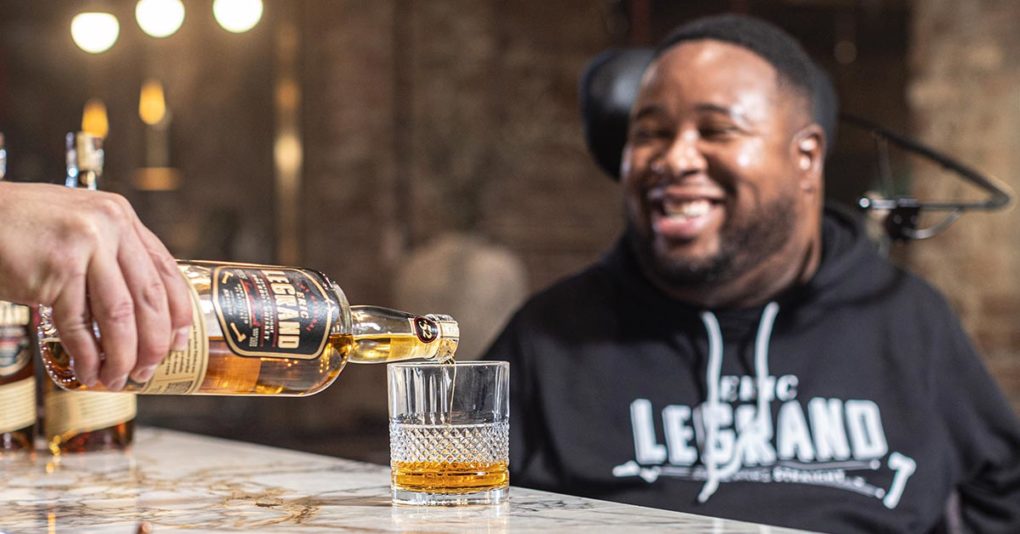 Eric LeGrand’s life was changed in 2010, when he became paralyzed while playing football as a defensive tackle for Rutgers University. The end of his athletic career marked the start of his entrepreneurial path, leading to his latest venture launched last year: Eric LeGrand Bourbon. Created with spirits entrepreneur Brian Axelrod, co-founder of Chica-Chida Tequila, and formerly a part of Proper No.Twelve and D’Ussé Cognac, the brand aims to end the stigma that those with disabilities aren’t able to enjoy the finer things in life.
Eric LeGrand’s life was changed in 2010, when he became paralyzed while playing football as a defensive tackle for Rutgers University. The end of his athletic career marked the start of his entrepreneurial path, leading to his latest venture launched last year: Eric LeGrand Bourbon. Created with spirits entrepreneur Brian Axelrod, co-founder of Chica-Chida Tequila, and formerly a part of Proper No.Twelve and D’Ussé Cognac, the brand aims to end the stigma that those with disabilities aren’t able to enjoy the finer things in life.
As his brand expands further out of its New Jersey homebase to New York and Massachusetts, we chatted with LeGrand about how a purpose-driven brand competes in a saturated category, what strategies he’ll use to extend awareness outside of his home turf, and where the lessons he’s learned from other businesses play a role in spirits.
It seems like you’re a hometown hero, but for those who don’t know you and as you expand your distribution, how are you getting your story across in the few minutes someone may be deciding on what bourbon to buy?
We made our bottle very descriptive of my story on the bottom of the label and then we also have a little piece on the back of our first bottle run, which shows that $5.20 from every case that we sell goes back to the Christopher & Dana Reeve Foundation, which is taking care of the people in the paralysis community as we look to find a cure.
It’s also a big deal to get on the cocktail menu as well. People might know Bulleit Bourbon and Maker’s Mark, so if they see my name and they don’t know my story, they might want to look it up.
Within New Jersey, how have you leveraged your name in the community to expand the business?
The first year we went heavy into off-premise accounts, getting into a lot of liquor stores so people could buy the bottles off the shelf. Once we are able to get in front of retailers and tell my story, they want to support me. I also hear from people who are new to bourbon and tried it because of me, so that’s an incredible thing to share.
People also call me the collab king. I love to collaborate with all different restaurants or businesses that want to support the brand. We partnered with Talercio’s Deli that came up with a branded sandwich using the bourbon for a peach barbecue sauce and we worked with Nicholas Creamery, which made a peanut butter whiskey flavor for the summer. Our goal is to get people on the ground in other states to set up similar events.
You were the first spirit brand to partner with Rutgers Athletics, with your football connection is that a partnership you hope to replicate or is it unique to your history with them?
It definitely was unique, and especially in the beginning, as we’re still young in this business, we want to make sure we capitalize on the Rutgers market. It’s a two year deal, people are able to tailgate in a parking lot drinking the bourbon and it’s also served in the premium areas, like the suites at the football game, and then the private area above basketball matches.
You also have a coffee house, what are some of the lessons you’ve applied from that business to being in this new venture?
Each day is a grind, no pun intended, but you have your good days, and you have your bad days. Obviously having Brian on board there haven’t been as many mistakes made because he’s been in this business his whole life, but with coffee I was working on my own and figuring it out, so that was a bit of a struggle.
But it’s better now having a great team around. Because I can’t physically get behind the counter or I can’t physically go somewhere and meet somebody, I need help. So I have to trust the people around me and make sure that I have great people that are going to help me and guide me along the way.
What have been some of the surprises entering the spirits business?
Well, it’s all about moving cases. And sometimes places are very supportive, sometimes you gotta push, and sometimes they ghost you. Obviously, Brian and I are as passionate as could be about it, but trying to get other people to be just as passionate is hard— it’s great when they are, but I now understand that not everyone will be. So we’re trying to do what we can to get them to that level and if not, we’re moving onto the next opportunity.